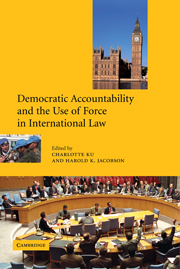Book contents
- Frontmatter
- Contents
- List of figures
- List of tables
- Notes on contributors
- Preface
- List of abbreviations
- I Introduction
- II The domestic and international context
- 2 The interface of national constitutional systems with international law and institutions on using military forces: changing trends in executive and legislative powers
- 3 Domestic political factors and decisions to use military forces
- 4 Collective security, peacekeeping, and ad hoc multilateralism
- 5 The legal responsibility of military personnel
- III Traditional contributors to international military operations
- IV Newcomers to international military operations
- V Permanent members of the UN Security Council
- VI Conclusion
- Appendix A. Uses of military forces under the auspices of the UN and NATO
- Appendix B. Country participation in international operations, 1945–2000
- References
- Index
4 - Collective security, peacekeeping, and ad hoc multilateralism
Published online by Cambridge University Press: 30 July 2009
- Frontmatter
- Contents
- List of figures
- List of tables
- Notes on contributors
- Preface
- List of abbreviations
- I Introduction
- II The domestic and international context
- 2 The interface of national constitutional systems with international law and institutions on using military forces: changing trends in executive and legislative powers
- 3 Domestic political factors and decisions to use military forces
- 4 Collective security, peacekeeping, and ad hoc multilateralism
- 5 The legal responsibility of military personnel
- III Traditional contributors to international military operations
- IV Newcomers to international military operations
- V Permanent members of the UN Security Council
- VI Conclusion
- Appendix A. Uses of military forces under the auspices of the UN and NATO
- Appendix B. Country participation in international operations, 1945–2000
- References
- Index
Summary
Putting collective security into practice
For centuries, diplomats, politicians, generals, scholars, and philosophers have struggled with the same question: can those with sufficient power to preserve order be trusted to do so in a just manner? In his account of the Melian Dialogue, Thucydides implied that justice would only emerge at the sufferance of the powerful. Hobbes suggested that the existence of order was possible only with submission to the most powerful authority: the Leviathan. The pursuit of a just and peaceful world has always seemed idealistic and impractical to many.
The decades of carnage that engulfed Europe at the end of the sixteenth century and the first half of the seventeenth century caused the monarchs of the region to seek more peaceful means of conducting their relations. The result of their efforts, the Peace of Westphalia, led to the creation of some of the founding documents of the contemporary state system. One of those documents, the Treaty of Osnabrück of October 1648, provided for an arrangement of mutual commitments very similar to the modern notion of collective security. That treaty's provision foreshadowed a concept of international relations that would intrigue influential international leaders and thinkers for centuries.
By the dawn of the twenty-first century, there was a good deal of international experience in using multilateral forces for collective purposes; but national leaders still resisted surrendering control of national military forces to external authorities.
- Type
- Chapter
- Information
- Publisher: Cambridge University PressPrint publication year: 2003

